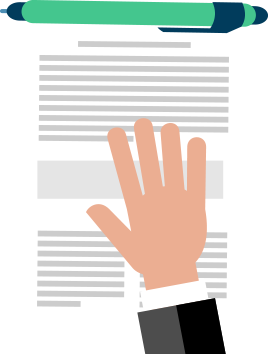What is bankruptcy and how does it work?
Bankruptcy is a form of insolvency, that is, a declaration that you are unable to reasonably pay off your existing unsecured debts. It can be either declared voluntarily by yourself or involuntarily by an aggressive creditor to whom you owe a lot of money.
Once you’ve declared bankruptcy (or been declared bankrupt), you will no longer need to interact with your creditors. They will no longer be able to take further court action against you, nor will you be bombarded with threatening letters or phone calls from those to whom you owe money. Instead, this responsibility, as well as responsibility of your assets and money, will be taken over by a trustee. This trustee will either be an official receiver (an officer appointed by the bankruptcy court) or an insolvency practitioner (a debt specialist, usually an accountant or lawyer).
A bankruptcy order will usually last a year, after which your existing debts will be written off and you will, for all intents and purposes, be able to start over financially. Declaring bankruptcy involves going to court and the whole process will cost around £700, more if you use the services of a solicitor, which can be helpful but is not necessary.
For more help and advice, contact debt charity StepChange

More information about bankruptcy
You will however, be able to keep certain assets including any possessions you need for work, such as any work vehicles or any tools, as well as basic household items like furniture, bedding and clothes.
Your bank and credit card accounts will be frozen at the banks’ discretion and any relevant cards handed over to your trustee. There will be exceptions to this though:
you’ll be able to access any money deemed necessary to purchase things like food, and if you have a joint bank account, then the secondary account holder will still be able to use their funds.
You will have to give up what is known as your beneficial interest in your property. This is the share of the property you own either after any secured debts like mortgages have been paid off, or your share of a jointly owned property.
There are exceptions to this though, you may be able to stop the sale of your house if: Your beneficial interest is worth under £1,000, or The beneficial interest or legal title can be passed on or sold to another individual like your partner.
You will also be able to delay the sale for a certain amount of time if you need to sort out somewhere for any of your dependents (i.e. your partner or children) to live.
If your home is sold as part of your bankruptcy arrangements, then you can get in touch with your local council or housing authority who may be able to arrange for you to stay in some form of social or public housing
Additionally, if you own a company, then the likelihood is that once you’ve been made bankrupt your business will be liquidated, any assets sold and any staff laid off.
Your trustee will decide whether or not (and how much of) your spare income needs to be used to contribute towards your monthly debt repayments. If this is the case, you’ll enter what is known as an Income Payments Agreement (IPA). If you do not enter this willingly, then your trustee can force you to – this is known as an Income Payments Order (IPO).
Once you’ve been discharged, most of your debts will be written off, with the exception of any debts that arise from fraudulent activity, or those that weren’t included in the actually bankruptcy claim in the first place like student debts.
A bankruptcy order will remain as a negative mark on your credit report for up to six years after its completion, making it more difficult for you to access any kind of credit during this time.
There are, however, other forms of insolvency or debt solution that may be applicable depending on the severity of the debt you are in. These other options include Individual Voluntary Arrangements (IVAs) or other debt consolidation arrangements like Debt Management Plans (DMPs).
Read our guides on both to find out more.



